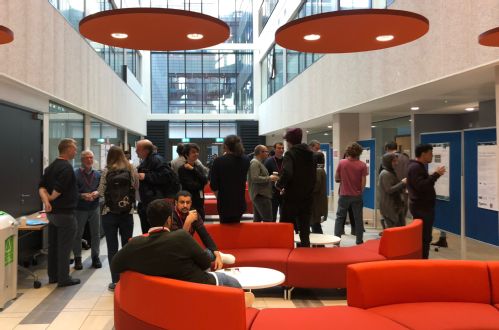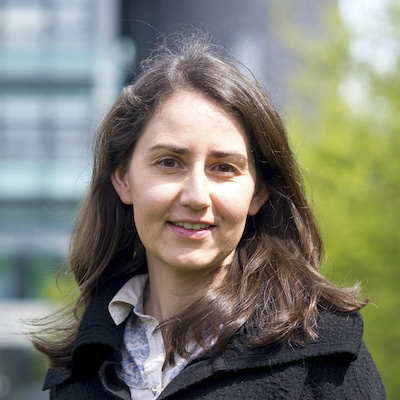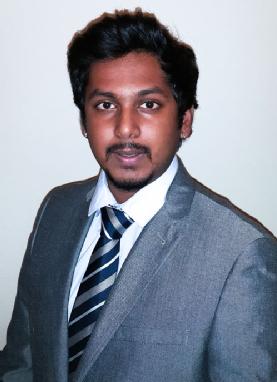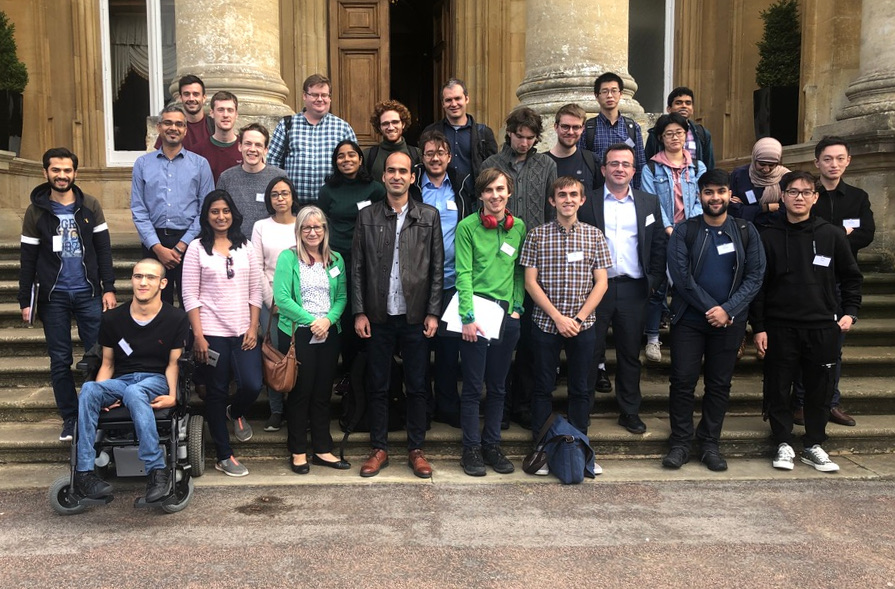Computer Science News
EPSRC funding success for Prof. Yulan He
Prof. Yulan He from the department's Data Science and Human-Centred Computing research themes has been awarded a 3-year EPSRC grant to develop a new framework to study model/data uncertainty and model interpretability of AI systems. The interdisciplinary project will assist system stakeholders and developers to understand and reason about the (business, personal, social, etc.) impact of intelligent systems on the world in which they operate, and to understand how and why decisions are taken. It will run in collaboration with Dr. Ritabrata Dutta from the Statistics Department, and Dr. Nelly Bencomo and Prof. Pete Sawyer from Aston University.
New EPSRC award to support combating caller ID spoofing

Professor Feng Hao (PI) from the Department of Computer Science and Dr Adrian von Mühlenen (co-I) from the Department of Psychology have been awarded an EPSRC grant on “End to End Authentication of Caller ID in Heterogeneous Telephony Systems”. This project will support a research fellow and a senior research fellow in computer science, each for four years, to explore new ways to stop caller ID spoofing without requiring globally trusted authorities, in collaboration with researchers from the Department of Psychology. This project will also aim to develop impacts by engaging with the telecommunication industry via the project partners: Huawei, Truecall, and RedTone.
The award of this project coincided with the announcement in March 2020 by the Federal Communications Commission (FFC), who proposed mandating the adoption of STIR/SHAKEN for all telecom providers in the US in order to stop the caller ID spoofing scams. However, STIR/SHAKEN requires globally trusted authorities, which have been known to be difficult to manage. As opposed to the top-down approach by the FCC, this EPSRC project aims to take a bottom-up approach to develop more effective and more deployable solutions without relying on any globally trusted third parties.
A University press release on this project can be found here.
Promotions for three academic colleagues
 We are delighted to report that Dr Claire Rocks has been promoted to Associate Professor, and that Dr Florin Ciucu and Dr Matthew Leeke have been promoted to Reader, effective from 1 June 2020. Quoting from Matt's recommendation,
We are delighted to report that Dr Claire Rocks has been promoted to Associate Professor, and that Dr Florin Ciucu and Dr Matthew Leeke have been promoted to Reader, effective from 1 June 2020. Quoting from Matt's recommendation,
Dr Leeke has a number of internationally excellent publications, and has contributed to several research grants, the two largest ones being strategic industrial collaborations. … In addition to his sustained teaching excellence in the department, Dr Leeke has led and contributed to a variety of key educational activities at the departmental, faculty and institutional levels.
from Florin's recommendation,
Dr Ciucu’s high esteem by members of his international research community is evidenced by his services in editing leading journals and being on programme committees of highly ranked conferences. … Dr Ciucu is known in the department for the quality of his teaching and high levels of student engagement in his modules, which have included a challenging but central MSc module in data analytics.
and from the recommendation for Claire,
Dr Rocks has been an educational leader in the department as well as nationally, both through her scholarship-led development and delivery of modules (1st-year and 3rd-year undergraduate, and most recently for IATL and Warwick in London), and her contributions in the Academic Studies Committee in Computer Science. … Dr Rocks has built institutional, regional and national reputations through her leadership of outreach and engagement activities. In addition to delivering CPD for teachers with the National Centre for Computing Education, Dr Rocks has played key roles in numerous events including the British Science Festival, the Festival of the Imagination, the Cheltenham Science Festival, and Sutton Trust Summer Schools.
it remains to say many congratulations!
Warwick Postgraduate Colloquium in Computer Science 2019

The 17th Warwick Postgraduate Colloquium in Computer Science (WPCCS) was held on Monday 9 December, in the Mathematical Science Building for the first time. This year’s event saw 78 submissions from postgraduate research students in the Department. The submissions were split across six varied tracks, highlighting the breadth and depth of research currently being conducted by PhD students within the Department.
Student presentations were supplemented with two engaging guest talks from academics in the Department. Torsten Mütze captured everyone's attention with the mathematics behind origami, and Feng Hao enlightened the audience on the encryption challenges behind e-voting. The day concluded with a festive drinks reception, sponsored by the Department’s two Centres for Doctoral Training (CDTs), at which prizes were awarded to the best posters and presentations.
PhD student attendee Jonathan Davies said, “It was very rewarding for me to present at WPCCS this year. It gave me the opportunity to share my research with others and engage in stimulating conversation with my fellow postgraduate colleagues. The guest talks, in particular, were thought-provoking and engaging. I look forward to presenting at WPCCS in the future."
Hakan Ferhatosmanoglu, Director of Postgraduate Research and CS CDT, said, “It was a pleasure to attend WPCCS this year and to celebrate the excellent work that has been undertaken by our PhD students in the past year. It was great to see how everyone was having research discussions and exchanging ideas with each other.”
Prize Winners
- Best Presentation - John Pocock
- Best Poster - Tom Wood
- Best in Computational Biology - John Pocock, Rawan Abulsayli and Hammam Alghamdi
- Best in Theory, Foundations, and Discrete Mathematics - Alex Dixon and Thesjaswini Raghavan
- Best in Computer Security and Networks - Jasmine Grosso and Shin Wan
- Best in Machine Learning and Artificial Intelligence - Tom Wood, Abeer Almowallad, Gabriele Pergola, Haoyi Wang, Junyu Li and Helen McKay
- Best in High Performance Computing and Databases - Richard Kirk and Dean Chester
- Best in Urban Science - Jonathan Davies, Teddy Cunningham, Elisa Baioni, Ivana Tosheva and Shanaka Perera
Dr Maria Liakata receives a Turing Artificial Intelligence (AI) Fellowship

We are please to report that Dr Maria Liakata has received a Turing Artificial Intelligence (AI) Fellowship.
The Fellowships from The Alan Turing Institute, the UK’s national institute for data science and AI, aim to attract and retain exceptional researchers in artificial intelligence. Covering a broad view of AI, including applications of foundational disciplines across mathematical sciences, statistical sciences, computational sciences and engineering, Fellows collaborate across disciplines and have the opportunity to collaborate with academia, industry, government and the third sector.
Dr Liakata’s Fellowship will focus on creating time sensitive sensors from language and heterogeneous user generated content. Commenting on the research she said:
“Wide spread use of digital technology has made it possible to obtain language data (e.g., social media, SMS) as well as heterogeneous data (e.g., mobile phone use, sensors) from users over time. Such data can provide useful behavioural cues both at the level of the individual and the wider population, enabling the creation of longitudinal digital phenotypes.
“Current methods in natural language processing (NLP) are not well suited to time sensitive, sparse and missing data, collected over time or personalised models of language use. The Turing AI fellowship will allow me to establish a new area in NLP on personalised longitudinal language processing.
“I plan to develop sensors for capturing digital biomarkers from language and heterogeneous user generated content to understand the evolution of an individual over time. I want to make a significant contribution to mental health by working with clinical experts to create new tools based on the sensors, making it possible to assess and measure conditions in between clinician appointments.”
To read more on this story, please click here.
Dr Arun Prabhakar joins the department as a Research Fellow

Dr. Arun Prabhakar has joined the department to work as a Research Fellow on ASiMoV (Advanced Simulation and Modelling of Virtual Systems) in partnership with Rolls-Royce and a consortium of partners, including the universities of Cambridge, Edinburgh, Oxford and Bristol. He will be working with Professor Stephen Jarvis and Dr. Gihan Mudalige.
He received his BEng (Hons) and PhD degrees in Mechanical Engineering from the University of Nottingham. He was a recipient of the prestigious Dean's Excellence PhD Scholarship from the University of Nottingham. During the course of his research career he has published several papers and also won awards for his research work.
Before joining the University of Warwick, Dr. Arun worked as Research fellow in the Gas Turbine and Transmissions Research Centre(G2TRC) which hosts the Rolls-Royce University Technology Centre in the University of Nottingham. During his time in G2TRC he has worked with a number of academics in the university and engineers from Rolls Royce in order to help them get an insight of the multi-phase and turbulent flows that arise in an aero-engine using Computational Fluid Dynamics(CFD). Applications of his research at G2TRC included modelling the complicated two phase flow in various sections of the Aero-engine such as the gearbox and bearing chambers and also associated thin film flows.
CS PhD Welcome Event

The Department organised an off-campus induction event for the new PhD students in our Centre for Doctoral Training and Research. The agenda included presentations from academics on our large research projects, alongside short tutorials on theoretical computer science and advanced machine learning. There were also informal talks about PhD life, publishing high quality work, and pursuing a research career. The event concluded with a mini data dive using air quality data from London.
The two-day welcome event was held at Heythrop Park in Oxfordshire, which offered the students and academics the opportunity to meet each other in a relaxed environment. The students also met with some of the current PhD students and asked them about their experiences. The programme was very productive with overwhelmingly positive feedback.
We welcome our new cohort of PhD students and look forward to organising similar events across the coming years.
